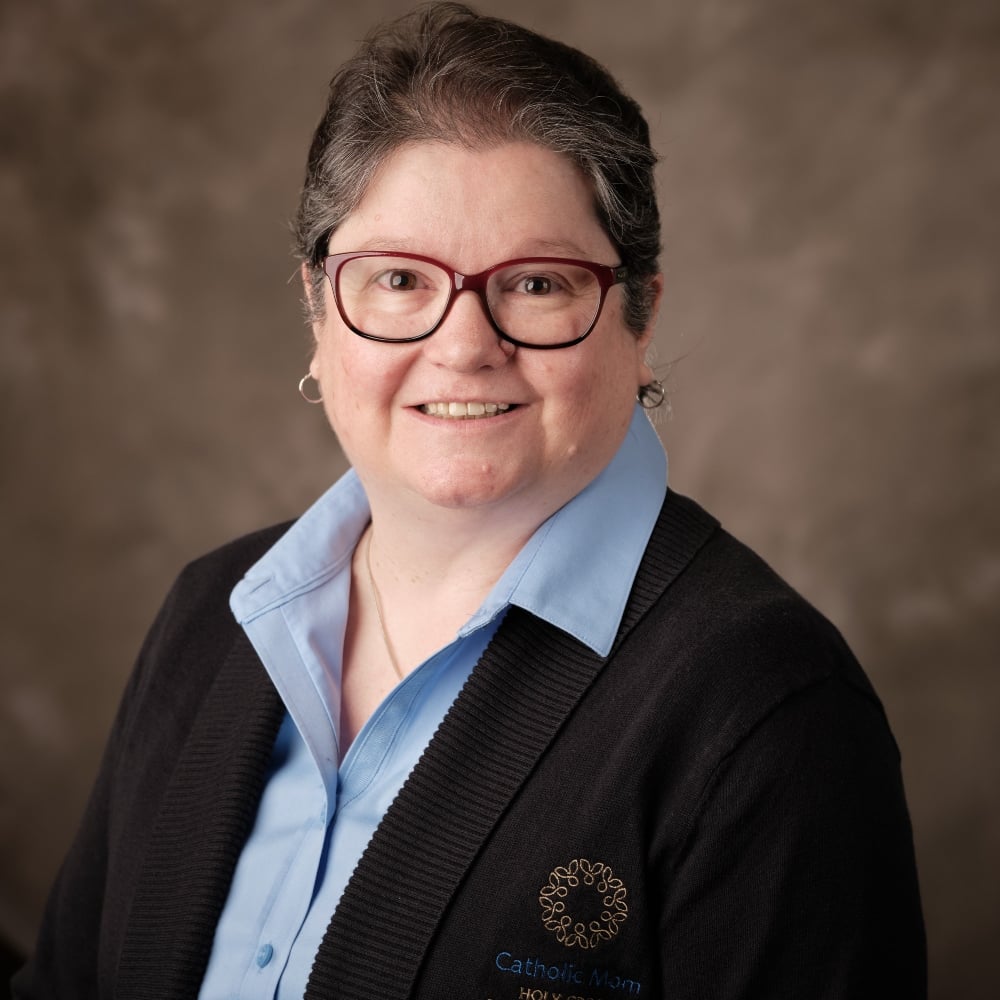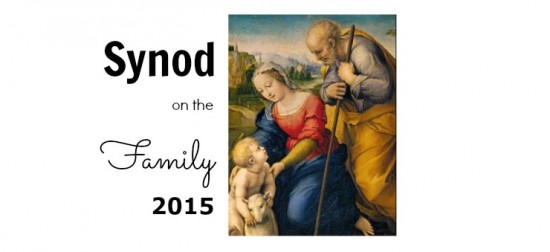Today's News from the Synod on the Family:
https://youtu.be/h89HVRAPWys
The spirit of the family is the constitutional charter of the Church
Vatican City, 7 October 2015 (VIS) – During the period of the Synod dedicated to “The vocation and the mission of the family in the Church and the contemporary world”, the catechesis of the Wednesday general audiences will focus on various aspects of the relationship between the Church and the family, the Pope announced this morning to the thousands of faithful gathered in St. Peter's Square. Francis asked all to pray for a good outcome of the Synod assembly, and underlined that the family deserves all the dedication of which the Church is capable, and therefore the Synod is called upon to interpret the care of the Church for the family in our times.
“Men and women of today are in need of a robust injection of family spirit”, he continued. “Indeed, the style of relations – civil, economic, legal, professional, and as citizens – would appear very rational, formal and organised, but also very 'dehydrated', arid and anonymous. At times this becomes unbearable. While seeking to be inclusive in its forms, in reality it abandons an ever greater number of people to solitude and exclusion”.
The family, however, “opens for the whole of society a far more human prospect: it opens children's eyes onto life … and introduces them to the need for bonds of fidelity, sincerity, trust, cooperation and respect; it encourages the planning of an inhabitable world and the belief in relationships of trust, even in difficult situations. … And we are all aware of the indispensable nature of the care of the family for its smallest members, the most vulnerable, the wounded, and even those who have encountered the most disasters in the conduct of their lives”.
Nevertheless, the Pope remarked, “the family is not granted due recognition or support in the political and social organisation of contemporary society. I would add: not only does the family not receive adequate recognition, but it no longer generates learning. At times it would seem that, in spite of all its science and technology, modern society is still not able to translate this knowledge into better forms of civil coexistence. … In this situation, the opposite extremes of this brutalisation of relationships – that is, technocratic obtuseness and amoral familism – come together and feed into one another. It is a paradox”.
“The Church perceives today, at this precise point, the historical meaning of her mission with regard to the family and genuine family spirit; starting from a careful revision of life. .. It could be said that the 'family spirit' is a constitutional charter for the Church. This is how Christianity should appear and should be. … The Church is and must be the family of God”.
The Pope recalled that when Jesus invited Peter to follow Him, He said that He would have made him a “fisher of men”. “And this called for a new type of net. We could say that today families are one of the most important nets for the mission of Peter and the Church. It is not a net that takes prisoners! On the contrary, it liberates from the treacherous waters of abandonment and indifference, that drown many human beings in a sea of loneliness and indifference. Families are well aware of the dignity of being sons and not slaves or outsiders”.
“From here, from the family, Jesus begins again his path among human beings to persuade them that God has not forgotten them. From here Peter takes strength for his ministry. From here the Church, in obedience to the Word of the Master, goes out to fish offshore, sure that if it takes place, the catch will be miraculous. May the enthusiasm of the Synod Fathers, inspired by the Holy Spirit, kindle the zeal of a Church that abandons the old nets and goes out to fish again, trusting in the Word of her Lord. Let us pray intensely for this! Indeed, Christ promised and reassures us: if even a bad father does not refuse to give bread to his hungry children, of course God would not refuse to give the Spirit to those who, imperfect as they are, ask with impassioned insistence”.
The official English-language summary of the Holy Father’s prepared remarks
“During the Synod of Bishops, I would like to reflect on some aspects of the profound relationship between the Church and the family, with a view to the common good of society. When families journey along the way of the Lord, they offer a fundamental witness to God’s love, and they deserve the full commitment and support of the Church. In the family we learn of the bonds which unite us, of fidelity, sincerity, trust, cooperation and respect, even when difficulties abound. Indeed it is in family life that the most vulnerable of society are cared for. And yet, political and economic life today does not always support the family, and seems to have lost the ability to incorporate the virtues of family life into the common life of society. Here the Church is called to exercise her mission by first examining to what extent she is living as the family of God. Like Saint Peter, the Church is called to be a fisher of men, and so too needs a new type of net. Families are this net. They free us from the sea of loneliness and indifference, so that we can all experience the freedom of being children of God. May the Church go out into the deep, confident that the catch will be great. And may the Synod Fathers, inspired by the Holy Spirit, encourage the Church to cast out her net with confidence and faith in the Word of God.”
Synod on the Family: Press Briefing Day 3 via News.va (see video above)
At the press briefing today the Holy See Press Office announced that the Synod Fathers had elected chairpersons and moderators for their “circuli minores” (small groups). The thirteen groups were determined by language. The groups began to work on Wednesday morning on the first part of Instrumentum Laboris which outlines the context in which contemporary family life is lived.
Jesuit Father and director of the Holy See Press Office, Federico Lombardi, was joined by Archbishops Charles Chaput of Philadelphia, Laurent Ulrich of Lille, and Salvador Piñeiro García-Calderón of Ayacucho o Huamanga of Peru. Fr. Lombardi invites some of the Synod Fathers as guests to the daily briefings.
García-Calderón said the Fathers had exchanged views and opinions among themselves in his Spanish-speaking group. He said the work happened in a “fraternal atmosphere” and that the bishops “think the same on many issues.”
Archbishop Charles Chaput gave some reflections on the recent World Congress of Families in Philadelphia. He said that he was unsure of the impact the Congress would have on the Synod but that he does know it “had an impact on the Holy Father and a big impact on me.” He said that the people who had come to Philadelphia, although chosen by their respective dioceses, celebrated “what the Church understands about family life.” The Arcbishop said there were roars of approval when people heard what the Church traditionally taught at the Congress. “We must affirm the ninety-nine when we go looking for the one,” he said.
Chaput said that it was good to have non-voting members in the working group, especially women, who helped the bishops come to a better understanding of family life.
Archbishop Ulrich explained that his group was made up of people speaking the same language but culturally very different. “Just because we speak the same language does not mean we find agreement and therefore we have to discuss and harmonise.” Ulrich added that he found the atmosphere in the group conducive to work.
Chaput said that the issue of language was raised a number of times. He said the official English translation from Italian had to be carefully studied so that the bishops could be sure that it captured the sentiments of the original Italian document. “There are serious issues we don’t understand, so this is a problem. We cannot vote if we do not know what we are voting for,” he said.
Questions were asked about how the Synod would use more sensitive language when talking about, for example, homosexual people. García-Calderón said the language of love must be spoken. Chaput said he did not know how this would be done but that the Fathers had to be careful. “The language is a big issue, it's not just sensitivity to the world but also sensitivity to the Gospel and the truth of the Gospel and we have to be careful in the language we use to protect both,” Chaput said.
Fr. Lombardi said that the interventions of prelates at the Synod were not being distributed by the press office. He said that some of them are putting their papers on blogs and other websites and this was at their own discretion. He said that the interventions of the married couples, present at the Synod, would be made available to the media.
Archbishop Chaput added that he has never been to a meeting where there is no lobby for a certain direction. “That’s going on, I can assure you. That’s what happens when human beings get together. We shouldn’t be scandalised or surprised by that, as along as it is done upfront and honestly and not in a way that tries to win, rather than arrive at the truth.”
Other Synod resources:
Catholic News Service: special section on the Synod of Bishops
About the Author

Barb Szyszkiewicz
Barb Szyszkiewicz, senior editor at CatholicMom.com, is a wife, mom of 3 young adults, and a Secular Franciscan. Barb enjoys writing, cooking, and reading, and is a music minister at her parish. Find her blog at FranciscanMom and her family’s favorite recipes with nutrition information at Cook and Count. Barb is the author of The Handy Little Guide to Prayer and The Handy Little Guide to the Liturgy of the Hours, available from Our Sunday Visitor.



.png?width=1806&height=731&name=CatholicMom_hcfm_logo1_pos_871c_2728c%20(002).png)
Comments